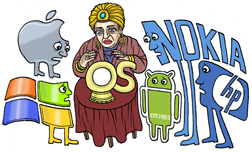Last week, John Gruber of the blog Daring Fireball wrote that "the next six months are going to set the foundation for the future of personal computing." Gruber argues that the rise of tablet computing marks the beginning of the "post-PC era." He makes a compelling case. The iPad is less than a year old, but it now accounts for 17 percent of Apple's revenue—nearly as much as the company brings in from the Mac. Sometime this year, Apple will announce a new iPad, and with that the tablet will likely become Apple's second biggest product line after the iPhone. (Gruber, one of the savviest Apple watchers on the Web, predicts that Apple will put out two new iPads this year: a camera-equipped iPad 2 that will arrive in the next couple months, and then some kind of advanced iPad 2—perhaps with a higher-resolution display—in the fall.)Apple's rivals are rushing to catch up. Two weeks ago Google held a press event to show off Honeycomb, a version of its Android OS that's been optimized for tablet computers. The first Honeycomb device, the Motorola Xoom tablet, will go on sale later this month for $800. Last week, HP unveiled two new phones (the large Pre 3 and the small Veer) and a tablet called the TouchPad, all of which should go on sale in the next six months. Each of these devices will run WebOS, the fantastic mobile operating system that HP acquired as part of its purchase of Palm. To underscore Gruber's point that we're moving beyond PCs, HP also promised that it would begin installing WebOS on a number of other devices, including printers, laptops, and desktops. HP, by the way, is the largest seller of Windows PCs in the world.
Finally, there was news from Finland. Stephen Elop, the new CEO of Nokia, wrote a scathing memo to employees warning that the company was standing on a "burning platform." Nokia, he said, has failed to compete in the smartphone era and now needed to do something "bold and brave" to survive. On Friday, Elop announced his plan: He would join up with Microsoft and make Windows Phone the company's main smartphone platform.
Taken together, these developments show that mobile operating systems are sweeping the computer business. Every big tech company will now focus on phones and tablets as its next big source of revenue while PCs will take up an ever-smaller share of the pie. This shift isn't entirely surprising. Apple and Google have been operating on a mobile-first basis for a few years now. But HP's full embrace of WebOS, and Microsoft's aggressive push to get its new mobile operating system on Nokia, show that even the companies that are most entrenched in the PC business are planning for a future that will be dominated by computers that look a lot more like the iPad than the MacBook.
But these announcements also suggest a period of uncertainty for the tech industry and for consumers. Apple, Google, Microsoft, HP, and Research in Motion, which makes the BlackBerry, are each producing a specific version of tomorrow's computer, one that's largely incompatible with its competitors. For at least a decade, it's been relatively easy to go out and buy a computer: You just had to go to the store and get the fastest Windows machine that fit your budget. You could be assured that most hardware and software would work with it, and that you'd get two to four years out of it before it became obsolete.
Your purchasing decision won't be so obvious in the next generation of computers. So far, here's what we know about tomorrow's machines: They will be small, portable, and constantly connected to the Internet. They'll feature combinations of input systems—touch and speech-recognition, in addition to the keyboard and mouse—and they'll come in a variety of shapes and sizes. They'll be cheaper than today's PCs, but we'll probably have more of them: You'll have a small one in your pocket, a medium-sized one to read on the train, a large one for your desk, and a great big one on the wall. Most importantly, they'll be easy to use. Anybody will be able to figure out how to install programs and download music and movies. They will be hardened against malware, they'll perform maintenance tasks—updates, backups—automatically, and you won't need to worry about organizing your files.
and follow him on Twitter.Farhad Manjoo is Slate's technology columnist and the author of True Enough: Learning To Live in a Post-Fact Society. You can e-mail him at ")farhad.manjoo@slate.com');
Illustration by Mark Alan Stamaty.
Monday, February 14, 2011
iPad 2, Xoom, TouchPad: The tablet age is upon us. - By Farhad Manjoo - Slate Magazine
via slate.com
Housing Crash Is Hit
Housing Crash Is Hitting Cities Thought to Be Stable – NYTimes.com: Stuart Isett for The New York Times Homes... http://twurl.nl/qyysgh
Housing Crash Is Hitting Cities Thought to Be Stable - NYTimes.com
 Stuart Isett for The New York Times
Stuart Isett for The New York TimesHomes in Seattle, where houses are lingering on the market.
via nytimes.com
Subscribe to:
Posts (Atom)

